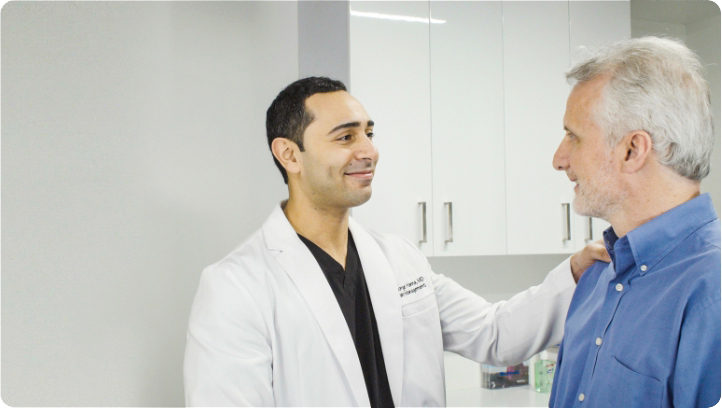Advice from A Well-Known Sciatica Pain Doctor Near Me in West Orange
September 22, 2021
Acute Low Back Pain – 6 Questions Answered
Acute low back pain might indicate the onset of a back problem. However, while chronic pain can develop from acute discomfort, you can avoid long-term problems with proper pain management. For this purpose, Dr Laura Lombardi, a board-certified sciatica pain doctor near me in West Orange is here to answer a series of questions about the symptoms, causes, and methods of treatment for acute low back pain.
But first things first: what exactly is acute low back pain?
Acute low back pain is defined as discomfort, stiffness, or muscular tension that occurs anywhere along the lower back, from under the ribcage to just below the buttocks. The amount of time you’ve experienced the discomfort determines whether it’s chronic or not. Debate continues over how the pain should last to still be considered acute, but it is usually under 12 weeks.
Acute low back pain is one of the most common reasons individuals visit a back doctor, yet only a tiny fraction of those who suffer from it seek treatment. Symptoms, as with many forms of back pain, are typically subjective and difficult to evaluate with examinations or testing. This is why pain relief is the primary focus of treatment instead of the source of the pain.

Question #1 – What are the most common causes of acute low back pain?
Dr Laura Lombardi: “While acute low back pain can be the result of a localized injury, it is, most of the time, classified as “non-specific,” which means the pain doctor can’t tell for sure what’s causing it. This may be irritating to you as a patient, but, in most cases, therapy and a bit of rest are enough to make the pain go away.
Diagnostic imaging scans are usually unnecessary unless your physician notices symptoms of a serious health problem (known as red flags). If the discomfort does not go away despite therapy, such testing may be useful.”
Question #2 – How is acute low back pain treated?
Dr Laura Lombardi: “Pain medication and physical therapy are usually the first steps in treating acute low back pain. If you are used to working out, your doctor will probably advise you to keep active and recommend you adjust your routine to prevent further discomfort.
Pain medicines that are available over-the-counter or by prescription are the most common type of treatment, but your doctor will also provide advice on how to care for your back. If initial treatment is not enough, the doctor may recommend minimally invasive treatment to provide pain relief.”
Question #3 – Are there any risk factors associated with acute low back pain?
According to Dr Lombardi, acute low back pain is most common in adults between the ages of 35 and 55. Being in a static posture for long hours, such as while working at a desk all day, increases your chance of developing this sort of discomfort. Heavy physical labor, regular bending or twisting, and lifting are all contributing factors.
Multiple studies show excess weight can also increase the risk of developing acute back pain, as it can put additional pressure on the spine, compressing a nerve, or cause damage to the muscles. Smoking, as well as heavy use of alcohol, can also increase the chance of developing back pain.
Question #4 – How can I prevent my acute back pain from turning chronic?
Acute back pain can sometimes develop into chronic back pain. This may happen in two possible ways. For starters, if you don’t control inflammation and the resulting scar tissue, you’ll lose flexibility, which might lead to additional trauma. Muscle spasms and trigger points can also be caused by scar tissue.
Second, your body may go through permanent changes as you age, which cause your nervous system to wrongly intensify or alter feelings, resulting in chronic pain.
Dr Lombardi recommends early treatment and a healthy, active lifestyle as these are some of the most effective strategies to prevent acute back pain from becoming chronic.
Question #5 – Should I go see a sciatica pain doctor near me in West Orange?
While not every minor episode of pain requires a visit to a back doctor, seeking medical help for acute back pain can be a crucial step in your recovery. The reason for this is that early therapy may prevent a long-term back issue from developing.
A medical interview and a physical examination will usually be conducted during your visit to the doctor. The information the doctor collects during this consultation will help them in diagnosing your pain by categorizing it into one of the following: non-specific low back pain, nerve-related pain, or warning signs that should be further investigated. Your therapy and any necessary tests will most likely be dictated by your classification.
Question #6 – How do I keep acute back pain away?
The best remedy, as the old saying goes, is prevention.
Maintain your muscles flexible and strong with exercises that involve proper alignment to avoid acute low back pain. Yoga, Pilates, and other core-strengthening routines can help you work your full body and develop your muscles to better support the spine.
A good understanding of body mechanics can help you avoid acute low back discomfort. When lifting large things, for example, bend from the hips and knees rather than the back. Since your legs and hips are larger and stronger, this protects your spine. Good body mechanics also aid in keeping your spine in a well-aligned posture as you increase the weight you’re lifting.
If low back pain keeps giving you trouble, it may be time to visit a pain doctor and get to the bottom of the problem. Looking for a pain center in West Orange, NJ? Then don’t hesitate to make an appointment with us as soon as possible. Dr Laura Lombardi, a board-certified sciatica pain doctor near me in West Orange is here to help you get to the root cause of the problem. And, because we want all our patients to have access to the best possible treatment, we accept all major medical insurances. Call our West Orange, NJ Pain Center today or any of our conveniently-placed New Jersey and New York clinics!
Book a Consultation
Scheduling a consultation with one of our pain treatment specialists is one of the best ways to determine the proper solution for pain relief.
Meet Our Team of Back Pain Specialists
All of our Pain Doctors in New Jersey are Harvard Trained and Board Certified in Pain Management

Back Pain Doctor Clifton & West Orange NJ
Dr. George Hanna
Dr. Hanna is a Harvard Trained back specialist in New Jersey and New York. He serves as Medical Director of Pain Management.

Back Pain Doctor Clifton & West Orange NJ
Dr. Laura Lombardi
Dr. Lombardi is a Harvard Trained back pain treatment doctor, currently seeing patients in Clifton and West Orange, New Jersey.

Back Pain Doctor Clifton & West Orange NJ
Dr. Shane Volney
Dr. Volney is a Harvard Trained back treatment doctor seeing patients in the NJ areas of Clifton & West Orange, and in NYC.

Back Pain Doctor Clifton & West Orange NJ
Dr. Michael Nguyen
Dr. Nguyen is Harvard Trained and Board Certified in Pain Management. His pain center accepts major medical insurances and Medicare.

Dr. George Hanna

Dr. Laura Lombardi
Dr. Lombardi is a Harvard Trained back pain treatment doctor, currently seeing patients in Clifton and West Orange, and Paramus New Jersey.

Dr. Shane Volney
Dr. Volney is a Harvard Trained back treatment doctor seeing patients in the NJ areas of Clifton & West Orange, and in NYC.

Dr. Michael Nguyen
Dr. Nguyen is Harvard Trained and Board Certified in Pain Management. His pain center accepts major medical insurances and Medicare.
